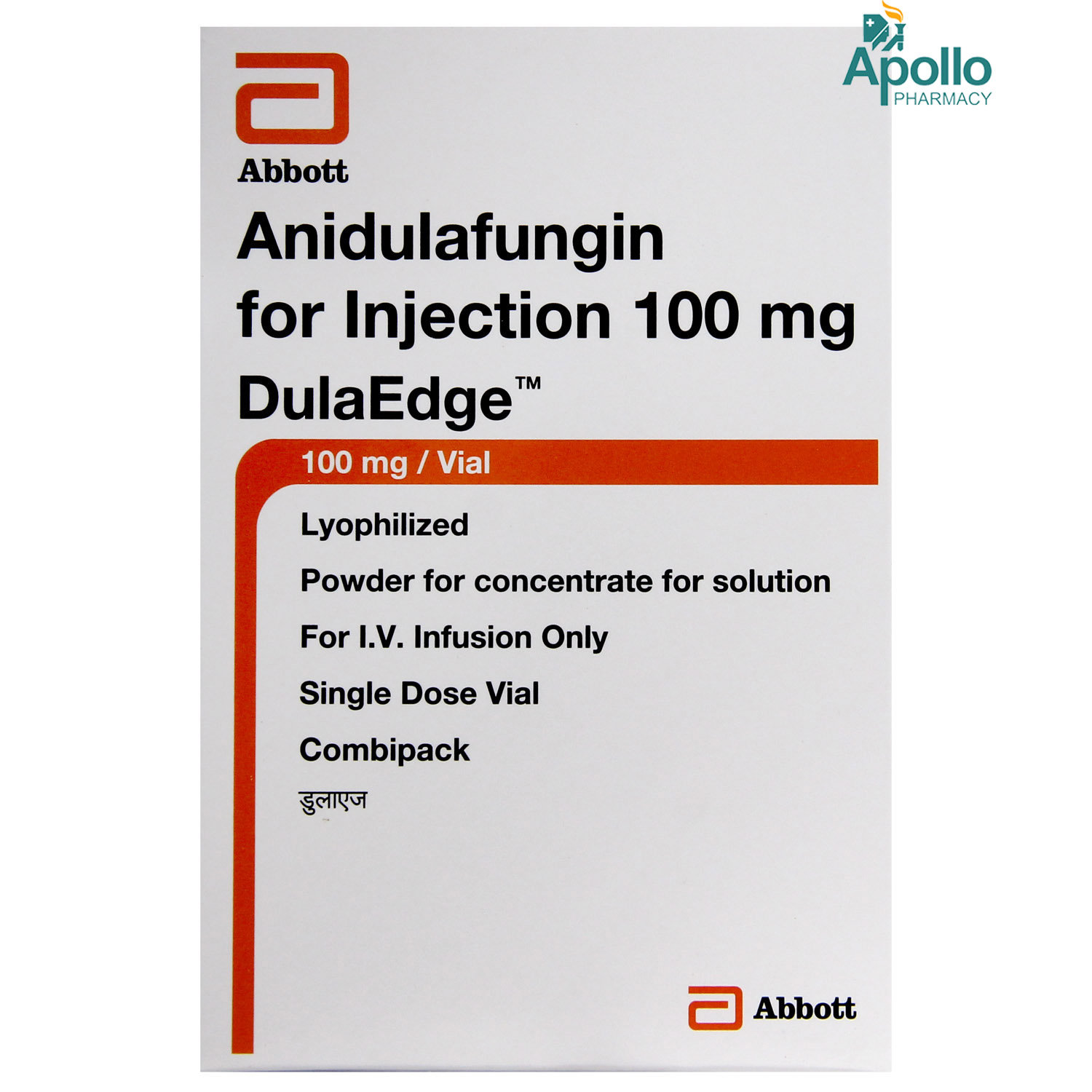Anidulafungin
About Anidulafungin
Anidulafungin belongs to the class of medicines called antifungals used to treat invasive candidiasis. Invasive candidiasis is a type of fungal infection of the blood or other internal organs caused by yeast (a type of fungus) called Candida.
Anidulafungin contains Anidulafungin, which works by preventing the normal development of fungal cell walls by making them fragile or unable to grow. Thus, Anidulafungin kills fungus and helps to treat fungal infection.
Anidulafungin will be administered by a healthcare professional; do not self-administer. Anidulafungin may cause common side effects such as nausea, diarrhoea, hypokalaemia (low blood potassium), headache, vomiting, or difficulty breathing. Most of these side effects of Anidulafungin gradually resolve over time and do not require medical attention. However, if the side effects worsen or persist, please consult your doctor.
Please tell your doctor if you are allergic to Anidulafungin, caspofungin, or any other medicines. Anidulafungin is not recommended for use during pregnancy. If you are of childbearing age, effective contraception should be used. If you are a nursing mother, take your doctor’s advice before receiving Anidulafungin.
Uses of Anidulafungin
Medicinal Benefits
Anidulafungin contains Anidulafungin, an antifungal drug which prevents the normal development of fungal cell walls by making them fragile or unable to grow. Thus, Anidulafungin kills fungus and helps to treat fungal infections of blood or other internal organs.
Directions for Use
Anidulafungin will be administered by a healthcare professional; do not self-administer.
Storage
Side Effects of Anidulafungin
- Nausea
- Diarrhoea
- Hypokalaemia (low blood potassium)
- Headache
- Vomiting
- Difficulty breathing
Drug Warnings
If you are allergic to Anidulafungin, caspofungin or any other medicines, please tell your doctor. Anidulafungin is not recommended for use during pregnancy. If you are of childbearing age, effective contraception should be used. If you are a nursing mother, take your doctor’s advice before receiving Anidulafungin. If you develop liver problems during your treatment with Anidulafungin, your doctor may monitor you more closely for liver function.
Drug Interactions
Drug-Drug Interaction: Inform your doctor about all the medicines you are taking, including prescription and non-prescription medicines, vitamins, and herbal supplements.
Drug-Food Interaction: No interactions found.
Drug-Disease Interaction: No interactions found.
Drug-Drug Interactions Checker List:
Safety Advice

Alcohol
consult your doctorThe interaction of alcohol with Anidulafungin is unknown. If you have any concerns regarding this, please discuss them with your doctor.

Pregnancy
consult your doctorIt is unknown how Anidulafungin affects pregnant women. Therefore, it is not recommended for use during pregnancy. However, if you are pregnant or planning pregnancy, inform your doctor before receiving Anidulafungin.

Breast Feeding
consult your doctorIt is unknown how Anidulafungin affects breastfeeding women. Therefore, take your doctor’s advice before receiving Anidulafungin while breast-feeding.

Driving
cautionThe effect of Anidulafungin on driving is unknown. Drive only if you are alert after taking Anidulafungin.

Liver
consult your doctorIf you have any concerns regarding the use of Anidulafungin in patients with liver problems, please discuss them with your doctor.

Kidney
consult your doctorIf you have any concerns regarding the use of Anidulafungin in patients with kidney problems, please discuss them with your doctor.

Children
consult your doctorIf you have any concerns regarding the use of Anidulafungin for children, please consult a doctor.
Habit Forming
Diet & Lifestyle Advise
Keep your hands clean.
Look for signs of early infection, such as pain or redness where a catheter or IV enters your body.
Be sure that anyone who touches you washes their hands first, including healthcare workers, as washing hands can prevent the spread of germs.
Patients Concern
Disease/Condition Glossary
Invasive candidiasis: It is a type of serious fungal infection that can affect blood, brain, heart, bones, eyes, and other parts of the body. It is caused by yeast (a type of fungus) called Candida. The most common symptoms include fever and chills that do not improve after antibiotic treatment for suspected bacterial infections. Other symptoms can develop if the infection spreads to other parts of the body, such as the brain, heart, bones, eyes, or joints.
FAQs
Anidulafungin contains Anidulafungin, which works by preventing the normal development of fungal cell walls by making them fragile or unable to grow. Thus, Anidulafungin kills fungus and helps to treat fungal infections of blood or other internal organs.
Invasive candidiasis is not contagious. However, the yeast itself can travel from person to person and on surfaces. It can be spread through healthcare workers' hands or contaminated medical devices.
Anidulafungin may cause headache as a common side effect. However, if the condition persists or worsens, please consult a doctor.





